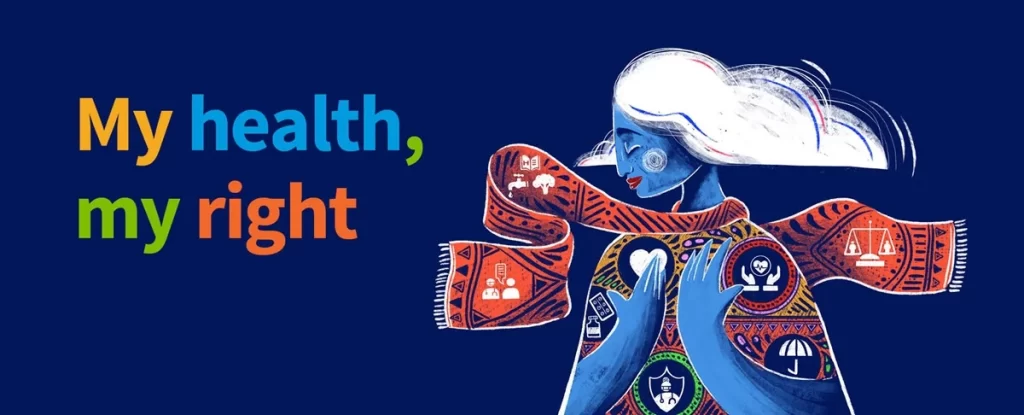
7th April 2024 is World Health Day. There are numerous ways to improve your health. According to the World Health Organisation, this year’s theme, “World Health Day 2024: My health, my right” was chosen to champion the right of everyone, everywhere to have access to quality health services.
Here are some tips to improve your health:
- Eat a balanced diet rich in fruits, vegetables, lean proteins, and whole grains.
A balanced diet provides the body with all the essential nutrients it needs to function properly, including vitamins, minerals, carbohydrates, proteins, and fats. Carbohydrates, proteins, and fats are macronutrients that provide energy for daily activities, bodily functions, and metabolic processes. Consuming a balanced diet helps regulate calorie intake, which can support weight management and prevent obesity-related health problems.
- Stay hydrated by drinking plenty of water throughout the day.
Staying hydrated is essential for maintaining proper bodily function, supporting physical and cognitive performance, and preventing dehydration-related health issues. It’s important to drink an adequate amount of water throughout the day to ensure optimal hydration.
- Exercise regularly to maintain a healthy weight, strengthen muscles, and improve cardiovascular health.
Incorporating regular exercise into your routine is essential for maintaining optimal health, vitality, and quality of life. It’s important to choose activities that you enjoy and can sustain over time to reap the maximum benefits. Research suggests that regular physical activity is associated with a longer lifespan and reduced risk of premature death from chronic diseases.
- Get enough sleep each night to allow your body to rest and rejuvenate.
Prioritizing sufficient sleep each night is essential for maintaining physical health, cognitive function, emotional well-being, and overall quality of life. Establishing healthy sleep habits and creating a conducive sleep environment can help optimize sleep quality and duration. Sleep deprivation impairs judgment, coordination, and reaction times, increasing the risk of accidents and injuries, particularly when driving or operating machinery.
- Manage stress through relaxation techniques such as meditation, deep breathing exercises, or hobbies.
Engaging in relaxation techniques helps to activate the body’s relaxation response, which counteracts the physiological effects of stress. This includes lowering heart rate, blood pressure, and cortisol levels, promoting a sense of calm and relaxation. Managing stress effectively can lead to better communication, emotional regulation, and conflict resolution skills, strengthening relationships with others.
- Avoid smoking and limit alcohol consumption.
Smoking is a leading cause of preventable diseases such as lung cancer, heart disease, stroke, and respiratory conditions like chronic obstructive pulmonary disease (COPD). Limiting alcohol consumption lowers the risk of liver disease, certain cancers, heart problems, and neurological disorders.
- Practice good hygiene by washing your hands frequently and maintaining a clean-living environment.
Handwashing is one of the most effective ways to remove germs and prevent the transmission of infectious diseases such as colds, flu, and gastrointestinal illnesses. Keeping living spaces clean reduces the presence of pathogens that can cause illness.
- Schedule regular check-ups with your healthcare provider for preventive care and early detection of any health issues.
Regular check-ups allow healthcare providers to assess your overall health status, identify risk factors for disease, and provide preventive interventions such as vaccinations, screenings, and lifestyle counselling. These measures can help prevent the development of chronic conditions and promote long-term health.
- Stay socially connected with friends and family to support your mental and emotional well-being.
Social connections provide a sense of belonging and companionship, reducing feelings of loneliness and isolation, which are associated with poor mental health outcomes such as depression and anxiety. Friends and family members offer emotional support, encouragement, and empathy during challenging times, helping individuals cope with stress, adversity, and life transitions more effectively.
- Consider incorporating activities that bring you joy and purpose into your daily routine.
Incorporating activities that bring you joy and purpose into your daily routine is essential for promoting happiness, reducing stress, enhancing motivation, improving mental health, boosting creativity, fostering resilience, strengthening relationships, and enhancing overall quality of life. Making time for activities that nourish your soul and bring you fulfillment is an investment in your well-being and happiness.